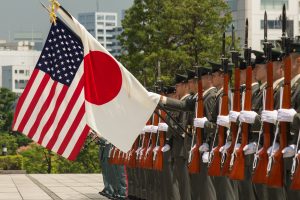On April 16, Japanese Prime Minister Suga Yoshihide will meet with U.S. President Joe Biden in Washington, D.C. The event is a noteworthy moment for both leaders: The prime minister will be the first foreign leader to meet Biden in person, and the summit will be Suga’s first trip to the United States as Japan’s leader. The meeting’s substance and tone, moreover, will indicate the direction of Biden’s Indo-Pacific policy, while displaying the two leaders’ ability to develop a good rapport and their commitment to a revitalized working relationship.
The summit is likely to focus heavily on China. Over the past decade, Beijing has grown increasingly assertive, and its competition with Washington has come to dominate geopolitics. China’s Belt and Road Initiative – a plan to promote global connectivity through government-funded infrastructure projects – and its territorial claims and island construction in the South China Sea are raising tensions throughout the Indo-Pacific. Biden and Suga will touch upon the critical role that Japan, as a frontline security ally of the United States, can play in blunting Beijing’s geopolitical ambitions.
Both sides recognize, however, that Japan can’t counter China alone. Talks will likely address the role of “the Quad” – a loose alignment consisting of Australia, India, Japan, and the United States. Although former U.S. President Donald Trump popularized the idea of a “free and open Indo-Pacific,” one of the Quad’s guiding interests, former Japanese Prime Minister Abe Shinzo conceived of it first. In August 2007, he introduced the concept of the “confluence of the two seas” during a speech on a visit to India. Abe described the countries bordering the Pacific and Indian Oceans as a single region – one in which like-minded democracies including Australia, India, Japan, and the United States had a unique interest.
The discussion will also touch upon the two countries’ bilateral history since World War II. The United States and Japan have maintained a security alliance for 70 years, and Suga and Biden have been important political players for the last half century: Biden as a six-term senator, chairman of the U.S. Senate Foreign Relations Committee, and vice president, and Suga as Abe’s longtime chief cabinet secretary. Both leaders’ longstanding careers in public service mean that they are well-placed to understand how Japan-U.S. security relations have evolved and how to maneuver so that the security relationship improves in the future.
Separately, the summit represents an important opportunity for both administrations to get to know each other before the June G-7 summit in the United Kingdom. In a marked departure from the unilateralism and “go it alone” ethos of the Trump era, the meeting is a chance for the two sides to strategize on a variety of pressing geopolitical challenges. Biden and Suga can coordinate their domestic COVID-19 responses, make infrastructure investment decisions, cooperate on climate change, and address authoritarian regimes in Iran, Myanmar, and North Korea. Biden will also use the summit to reaffirm Washington’s commitment to the Japan-U.S. bilateral relationship, and more broadly, reassert U.S. leadership on the global stage.
Finally, as the host of the Tokyo Summer Olympics, Japan wants to seize the chance to elevate its global status. Despite the pandemic, Japanese and International Olympic Committee officials have insisted that the event remains scheduled for July. Suga is expected to use the summit as an opportunity to invite Biden to the Games, further cementing bilateral ties ahead of the international event.
Japan-U.S. relations are entering a critical phase, and the April 16 summit represents a unique opportunity for both sides to reaffirm their partnership in the face of a daunting set of challenges: China’s rising geopolitical and military clout, North Korea’s growing nuclear program, and the ongoing COVID-19 pandemic, among others. A successful joint response to these problems is not foreordained. But if both leaders play their cards right, ties between Tokyo and Washington could anchor a peaceful and rules-based order in the Indo-Pacific for years to come.

































